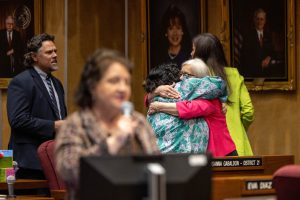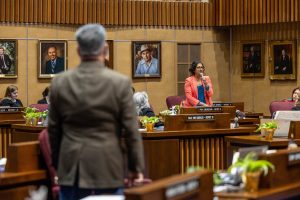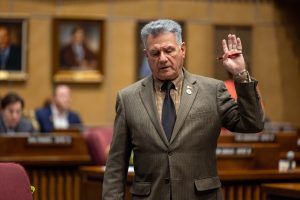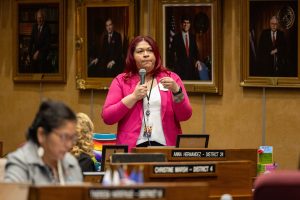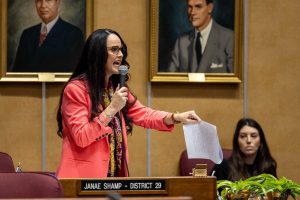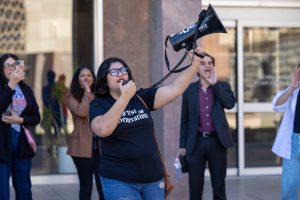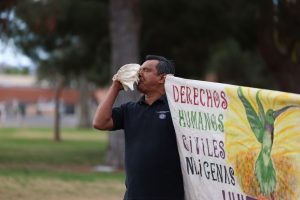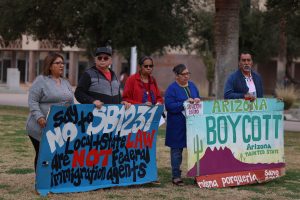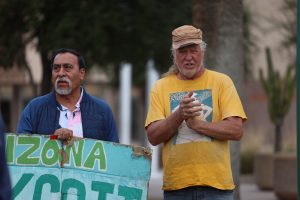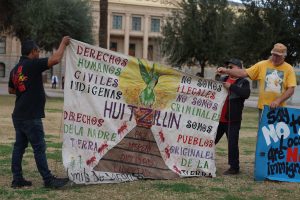EDS: UPDATES original lede, second and sixth grafs to reflect governor’s veto of SB 1231. No other changes.
- Slug: BC-CNS-Immigration Bills. 870 words.
- Photos available (thumbnails, captions below).
By David Ulloa Jr.
Cronkite News
PHOENIX – Gov. Katie Hobbs on Monday vetoed a bill that would have made it a state crime to cross the border illegally, one of a package of bills that critics have called modern versions of SB 1070.
Other bills in the package – including a proposed ballot initiative that would expand the use of E-Verify to welfare recipients as well as workers – have been approved in the House with strong Republican support, but have not yet reached the governor.
Critics such as Lena Avalos, a senior policy adviser at Living United for Change in Arizona (LUCHA), see the bills as “a coordinated attack on communities of color and immigrant communities.” They compare this year’s bills to SB 1070, the controversial 2010 Arizona legislation that gave local law enforcement the power to enforce immigration law.
“We’re seeing Arizona Republicans push one of the most extreme and racist, anti-immigrant bill packages in the history of this state,” Avalos said.
Under HB 2748, HB 2821 and SB 1231, crossing the border between ports of entry without proper documentation would be a state misdemeanor on the first offense, but would escalate to a felony on the second offense.
The House on Wednesday gave final approval, on a 31-28 party-line vote, to SB 1231 and sent it to the governor, who made good on her threat to veto the bill that she said was designed solely to “score cheap political points.” Hobbs said Monday that SB 1231 does nothing to secure the border, while it “demonizes our communities, hurts businesses and farmers, and burdens law enforcement and our judicial system.” Based on the narrow margins of passage in the Legislature, there do not appear to be enough votes to override that veto.
The governor may not have that option with HCR2060, a resolution that would go straight to the voters for their approval if it is passed by the Legislature. That proposal would expand the use of E-Verify, currently required to check workers’ citizenship status, to confirm that any adults receiving public assistance are lawful residents of the United States. Failure to use the E-Verify program would result in a felony charge.
According to the E-Verify website, the U.S. government program compares information from an employee’s I-9 form with U.S. Department of Homeland Security and the Social Security Administration records to determine an employee’s eligibility to work in the United States.
HCR 2060 resolution passed the House with straight Republican backing on Feb. 22 and is currently pending in the Senate.
Republican legislators say ‘we need to control the (migrant) numbers’
In the bills dealing with legal entry into the U.S., local law enforcement would be immune from civil liability for damages caused during enforcement. It would also allow local judges to order the deportation of individuals charged with the crime.
U.S. residents and people who qualified for the Deferred Action for Childhood Arrivals program between June 15, 2012, and July 16, 2021, would be exempt.
The Tucson sector had the most migrant encounters of any sector on the U.S. southern border with over 50,000 in January, and more than 250,000 in the first four months of fiscal 2024, according to Customs and Border Protection data.
State Sen. John Kavanagh, R-Fountain Hills, one of 13 Republican co-sponsors to SB 1231, said he supports the bill because he believes the border is in chaos and that the U.S. needs to secure its southern border.
Kavanagh said he believes the “federal government has turned the U.S. Border Patrol into a welcome wagon” that has been redirected from apprehension and deportation to the processing and transportation of people he believes are “making bogus migrant claims.”
Kavanagh said the U.S. needs to control the number of people entering the country so that it is not overwhelmed and “that our workforce is not diluted.”
“We need to control the numbers so we can continue to have legal immigration from countries all over the world,” Kavanagh said. “There are people on waiting lists who want to come into this country, but if their slots are being filled by millions of people pouring in illegally, these law-abiding decent people, many of whom have job skills that we need, will not get into the country.”
The introduction of these bills has created an uproar from Arizona advocacy groups, such as LUCHA, which dubbed them racist and xenophobic in a news release. Barrio Defense Committees and the National Day Laborer Organizing Network called for a national and international boycott against the state of Arizona at a Feb. 1 news conference.
Salvador Reza, a community coordinator, said that the border and current political climate is anti-immigrant.
“They see us as illegal aliens. But the thing is, they don’t realize that we have been going back and forth for 500 years and even longer because we are descendants of the very communities that are still here, the Indigenous communities. So we don’t feel like we are invaders. We feel like we belong in this land,” Reza said.
State Sen. David Gowan, R-Sierra Vista, another sponsor of SB1231, said during Senate floor debate on the bill that it has nothing to do with skin color.
“Don’t tell me what my vote is about. Don’t ever say that you know who I am inside because I must be racist against my own children,” Gowan said in reference to his mother-in-law who is from Mexico.
LUCHA’s Avalos said she believes that no one is asking for this bill.
“I think people are asking for safer communities. They’re asking for affordable housing. They’re asking for quality health care and education. And this doesn’t do any of those things,” Avalos said.
